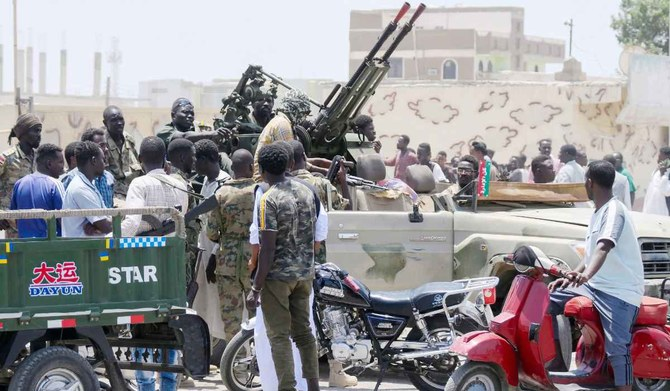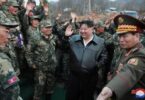KHARTOUM (Reuters): Fighting flared anew in Sudan late on Tuesday despite a ceasefire declaration by the warring factions as more people fled the capital Khartoum and former officials, including one facing international war crimes charges, left prison.
The Sudan Armed Forces (SAF) and paramilitary Rapid Support Forces (RSF) agreed to a 72-hour ceasefire beginning on Tuesday.
But gunfire and explosions could be heard after nightfall in Omdurman, one of Khartoum’s sister cities on the Nile River where the army used drones to target RSF positions, a Reuters reporter said.
The army also used drones to try to drive fighters back from a fuel refinery in Bahri, the third city at the confluence of the Blue Nile and White Nile.
Since Sudan erupted in warfare between the army and the RSF on April 15, derailing a transition to civilian democracy, the paramilitaries have embedded themselves in residential districts and the army has sought to target them from the air.
The fighting has turned residential areas into battlefields. Air strikes and artillery have killed at least 459 people, wounded over 4,000, destroyed hospitals and limited food distribution in a nation already reliant on aid for a third of its 46 million people.
A projectile hit Al-Roumi medical center in Omdurman on Tuesday and exploded inside the facility, injuring 13 people, a hospital official said.
PRISONERS RELEASED
In a further sign of deteriorating security, former Minister Ahmed Haroun, who is wanted by the International Criminal Court on charges of war crimes and crimes against humanity in Darfur, said he and other officials were allowed to leave Kober prison.
Following reports of a prison break in recent days, Haroun said that conditions at Kober had deteriorated badly. A protester imprisoned there said in a taped statement posted on Sunday that prisoners had been let go after a week with no water or food.
Haroun and the other released officials served under ex-President Omar Al-Bashir who came to power in a 1989 military coup and was ousted in a popular uprising in 2019. The ICC in the Hague has accused Haroun of organizing militias to attack civilians in a genocide in Darfur in 2003 and 2004.
The whereabouts of Bashir were not immediately clear. Separately, the World Health Organization (WHO) said one of the warring parties had taken control of a national health facility in Khartoum and expressed concern about potential biological hazards from measles and cholera pathogens for vaccinations stored there.
An exodus of embassies and aid workers from Africa’s third-largest country has raised fears that civilians who remain will be in greater danger if the shaky three-day truce deal, which expires on Thursday, does not hold.
US President Joe Biden’s national security team is continuing to talk to Sudan’s rival military leaders to end fighting and provide humanitarian aid, a White House spokesperson said on Tuesday.
The fighting has paralyzed hospitals and other essential services, and left many people stranded in their homes with dwindling supplies of food and water.
With bodies scattered in the streets, international aid group Medecins sans Frontieres (MSF) said it was alarming that it had been unable to get fresh supplies or personnel into Sudan.
The UN humanitarian office (OCHA) said shortages of food, water, medicines and fuel were becoming “extremely acute,” with prices for basic goods including bottled water surging, and it had been forced to cut back operations for safety reasons.
The UN refugee agency forecast that hundreds of thousands of people might flee into neighboring countries.
’WHY IS THE WORLD ABANDONING US?’
As foreign governments evacuated their nationals, those with nowhere to go said they felt forsaken. “Why is the world abandoning us at a time of war?” said Sumaya Yassin, 27, accusing foreign powers of being selfish. Since the fighting erupted, tens of thousands have left for neighboring Chad, Egypt, Ethiopia and South Sudan.
With civilians leaving Khartoum in cars and buses, the streets of one of Africa’s biggest metropolitan areas were largely emptied of ordinary daily life, with those still in the city huddling at home while fighters roamed outside.
“The situation has become very dangerous, including in areas not under bombardment,” French journalist Augustine Passilly said by phone as she tried to cross the border into Egypt.
“There is nothing left in stores, no water, no food. People have started to go out armed, with axes, with sticks.” Some fear the fighting between rival military leaders that has turned Khartoum into a war zone for the first time could reawaken war in the vast and largely desert western region of Darfur already scarred by a two-decade-old conflict.
Foreign countries have airlifted embassy staff out after several attacks on diplomats, including the killing of an Egyptian attache shot on his way to work.
Britain launched a large-scale evacuation of its nationals on military flights from an airfield north of Khartoum. France and Germany said they had each evacuated more than 500 people of various nationalities, and that a French commando had been hit by crossfire during the operation.







